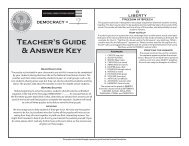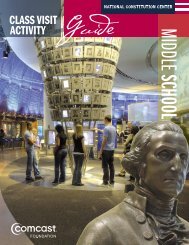2011 Press Release - National Constitution Center
2011 Press Release - National Constitution Center
2011 Press Release - National Constitution Center
Create successful ePaper yourself
Turn your PDF publications into a flip-book with our unique Google optimized e-Paper software.
CONTACT: Ashley Berke Kristen Cambell<br />
<strong>National</strong> <strong>Constitution</strong> <strong>Center</strong> <strong>National</strong> Conference on Citizenship<br />
215.409.6693 202-729-8038<br />
aberke@constitutioncenter.org KCambell@NCoC.net<br />
AS PRIMARY APPROACHES<br />
PENNSYLVANIA’S CIVIC HEALTH INDEX<br />
REVEALS POLITICAL ENGAGEMENT DEFICIT<br />
Pennsylvanians talk frequently…. but not about politics<br />
Pennsylvanians score high on joining community groups,<br />
but low on political participation<br />
Philadelphia, PA (March 15, 2012) – As Pennsylvania’s pivotal primary election nears, a<br />
new Census-based report reveals that Pennsylvania citizens are less politically engaged<br />
than citizens in other parts of the country. <strong>Release</strong>d today by the <strong>National</strong> <strong>Constitution</strong><br />
<strong>Center</strong>, the state’s second annual Civic Health Index ranks Pennsylvania last in the<br />
nation in the percentage of citizens who talk frequently about politics with friends and<br />
family.<br />
The Pennsylvania Civic Health Index was produced in partnership between NCoC (the<br />
<strong>National</strong> Conference on Citizenship), the <strong>National</strong> <strong>Constitution</strong> <strong>Center</strong> and the <strong>Center</strong> for<br />
Democratic Deliberation at the Pennsylvania State University. The comprehensive<br />
report provides a measure of civic habits such as voting, volunteering, community<br />
connectedness and many other indicators, which can collectively capture different levels<br />
of participation in our democracy. The report combines these individual measures of<br />
civic health into three composite measures: political action, social connectedness and<br />
public work (i.e. attending meetings and working with neighbors to fix community<br />
problems). The report was authored by Professor J. Michael Hogan and Mark Hlavacik<br />
of Pennsylvania State University.<br />
“The Pennsylvania Civic Health Index highlights the strong fabric of community and<br />
family life across the state, but also shines light on the need to provide more meaningful<br />
pathways to civic participation in the public square,” says David B. Smith, Executive<br />
Director of NCoC.<br />
-MORE-
ADD ONE/<strong>2011</strong> CIVIC HEALTH INDEX<br />
Pennsylvania ranked in the lowest third of states in virtually all measures of political<br />
action in this year’s assessment. One indicator of civic health where Pennsylvania<br />
showed a deep decline: the frequency with which citizens discuss politics with their<br />
family and friends. Only 20.9% of Pennsylvanians talked frequently about politics in<br />
2010, ranking 50 th in the nation. This is down significantly from 34.7% in last year’s<br />
report.<br />
In addition, Pennsylvania lags behind the rest of the nation’s voter turnout rate, a trend<br />
that has held true in most of the last ten presidential elections. The Commonwealth also<br />
falls behind in voter registration rates.<br />
Indicator PA <strong>National</strong> PA’s <strong>National</strong> Ranking<br />
Discussing politics 20.9% 26.0% 50 th<br />
Voter turnout 43.9% 45.5% 35 th<br />
Voter registration 64.6 % 65.1% 33 rd<br />
Other interesting findings show that:<br />
African Americans are the most politically engaged group throughout the<br />
Commonwealth, with 64% reporting at least one political action.<br />
68% of Pennsylvanians over age 65 report at least one political action, as<br />
compared to less than one third of Pennsylvanians ages 18-24.<br />
Education is the best predictor of political action in Pennsylvania, with 79% of<br />
college graduates engaging in at least one political act, as compared to only 36%<br />
of adults without high school diplomas.<br />
On measures of social connectedness and public work, Pennsylvania saw much better<br />
results. Though Pennsylvanians are reluctant to talk about politics with family and<br />
friends, 45.4% of residents (compared to 42.3% nationally) talk frequently with neighbors<br />
about other subjects, ranking 15 th in the nation. Despite low rates of political<br />
participation, Pennsylvania ranked 17 th in the nation on group participation, with 37.1%<br />
of residents (compared to 33.3% nationally) belonging to or participating in some sort of<br />
community organization.<br />
-MORE-
ADD TWO/<strong>2011</strong> CIVIC HEALTH INDEX<br />
“As the birthplace of America’s democracy, Pennsylvania has an unparalleled tradition of<br />
civic leadership,” said Governor Tom Corbett. “The Civic Health Index reminds us of our<br />
roots and challenges us to heed the call of active citizenship today. Our democracy<br />
works best when Pennsylvanians stay informed and involved.”<br />
“This year’s Civic Health Index calls for more attention to political engagement by all<br />
Pennsylvanians during a pivotal election year,” said <strong>National</strong> <strong>Constitution</strong> <strong>Center</strong><br />
President and CEO David Eisner. “As the <strong>National</strong> <strong>Constitution</strong> <strong>Center</strong> joins the nation<br />
in commemorating the 225 th anniversary of the <strong>Constitution</strong>, this report challenges all<br />
Americans to build on our strengths and find new ways of inspiring active citizenship.<br />
Here at the <strong>Center</strong>, we will continue to educate and empower citizens to engage in our<br />
democracy.”<br />
About the Civic Health Index<br />
The <strong>2011</strong> Pennsylvania Civic Health Index Report is linked to a national initiative of the<br />
<strong>National</strong> Conference on Citizenship (NCoC), an organization chartered by Congress that<br />
began publishing America’s Civic Health Index in 2006. In 2008, NCoC began<br />
partnering with local institutions to produce state-level reports. In 2009, NCoC was<br />
incorporated into the Edward M. Kennedy Serve America Act, and directed to expand<br />
the civic health assessment in partnership with the Corporation for <strong>National</strong> and<br />
Community Service and the U.S. Census Bureau. The NCoC Civic Health Index is<br />
designed to assess ways that everyday citizens take part in civic life – through political<br />
activity, service, charitable giving, social connectedness, and access to information and<br />
current events. Pennsylvania is part of NCoC’s growing coalition of 25 states and cities<br />
developing more localized assessments of their community’s civic health. The <strong>National</strong><br />
<strong>Constitution</strong> <strong>Center</strong>, in partnership with the <strong>Center</strong> for Democratic Deliberation at Penn<br />
State, analyzes and disseminates the results for Pennsylvania.<br />
The <strong>2011</strong> Pennsylvania Civic Health Index is available for download at<br />
www.constitutioncenter.org and www.ncoc.net/PACHI<strong>2011</strong>.<br />
-MORE-
ADD THREE/<strong>2011</strong> CIVIC HEALTH INDEX<br />
About NCoC (the <strong>National</strong> Conference on Citizenship)<br />
At the <strong>National</strong> Conference on Citizenship (NCoC), we believe everyone has the power<br />
to make a difference in how their community and country thrive. We are a dynamic,<br />
nonpartisan nonprofit working at the forefront of our nation’s civic life. We continuously<br />
explore what shapes today’s citizenry, define the evolving role of the individual in our<br />
democracy, and uncover ways to motivate greater participation. Through our events,<br />
research, and reports, NCoC expands our nation’s contemporary understanding of what<br />
it means to be a citizen. We seek new ideas and approaches for creating greater civic<br />
health and vitality throughout the United States. More information can be found at<br />
www.NCoC.net.<br />
About the <strong>National</strong> <strong>Constitution</strong> <strong>Center</strong><br />
The <strong>National</strong> <strong>Constitution</strong> <strong>Center</strong> is the first and only nonprofit, nonpartisan institution<br />
devoted to the most powerful vision of freedom ever expressed: the U.S. <strong>Constitution</strong>.<br />
Located on Independence Mall in Historic Philadelphia, the birthplace of American<br />
freedom, the <strong>Center</strong> illuminates constitutional ideals and inspires active citizenship<br />
through a state-of-the-art museum experience, including hundreds of interactive exhibits,<br />
films and rare artifacts; must-see feature exhibitions; the internationally acclaimed, 360-<br />
degree theatrical production Freedom Rising; and the iconic Signers' Hall, where visitors<br />
can sign the <strong>Constitution</strong> alongside 42 life-size, bronze statues of the Founding Fathers.<br />
As America's forum for constitutional dialogue, the <strong>Center</strong> engages diverse,<br />
distinguished leaders of government, public policy, journalism and scholarship in timely<br />
public discussions and debates. The <strong>Center</strong> also houses the Annenberg <strong>Center</strong> for<br />
Education and Outreach, the national hub for constitutional education, which offers<br />
cutting-edge civic learning resources both onsite and online. Freedom is calling.<br />
Answer it at the <strong>National</strong> <strong>Constitution</strong> <strong>Center</strong>. For more information, call 215.409.6700<br />
or visit www.constitutioncenter.org.<br />
About the <strong>Center</strong> for Democratic Deliberation<br />
The <strong>Center</strong> for Democratic Deliberation at Penn State University was founded in 2006 as<br />
a nonpartisan, interdisciplinary center for research, teaching and outreach on issues of<br />
civic engagement and democratic deliberation. It is concerned with two of the most<br />
-MORE-
ADD FOUR/<strong>2011</strong> CIVIC HEALTH INDEX<br />
basic requirements of a healthy participatory democracy: 1) a citizenry with the<br />
knowledge and communicative skills necessary for engaged democratic citizenship; and<br />
2) a culture of vibrant, informed deliberation, where citizens discuss, debate and render<br />
collective decisions on matter of public importance. More information can be found at<br />
http://cdd.la.psu.edu/.<br />
###



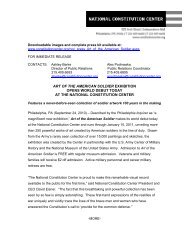

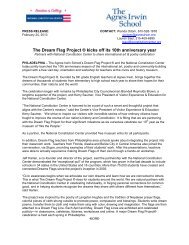
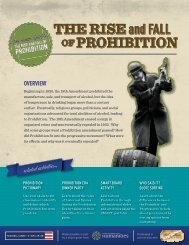

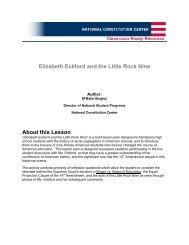
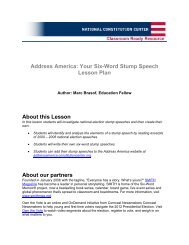
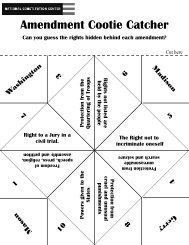
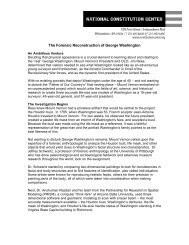
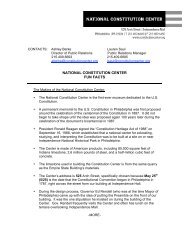
![Preamble Scramble [PDF] - National Constitution Center](https://img.yumpu.com/33840276/1/190x245/preamble-scramble-pdf-national-constitution-center.jpg?quality=85)
